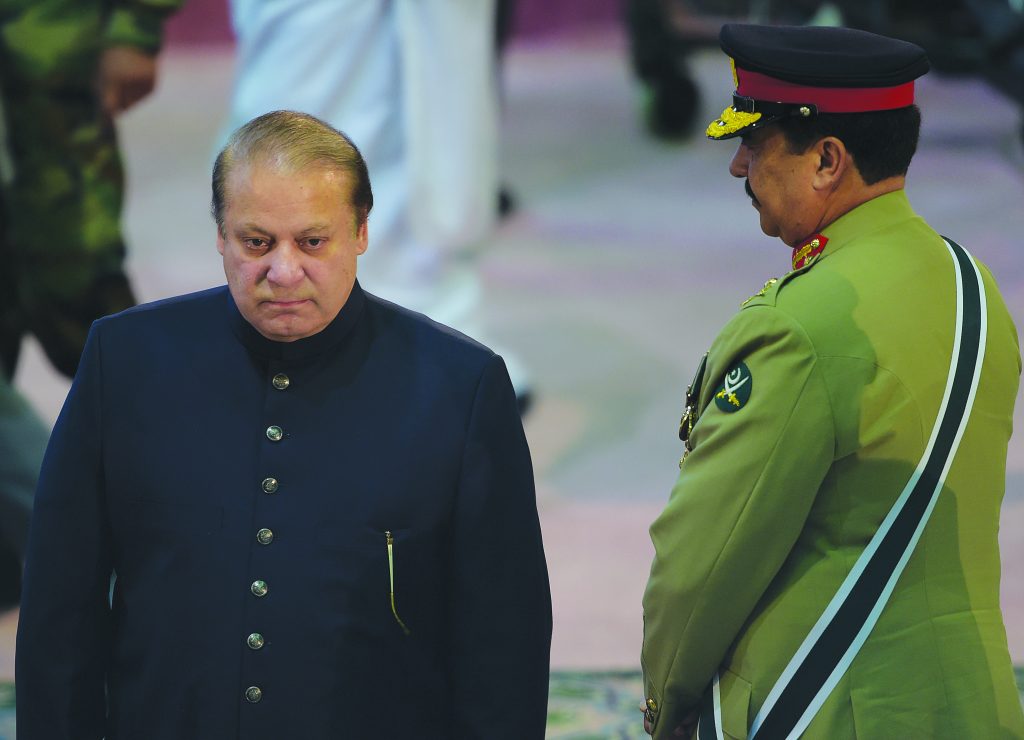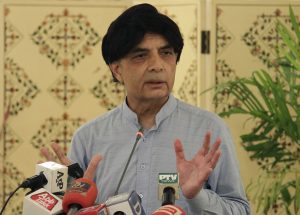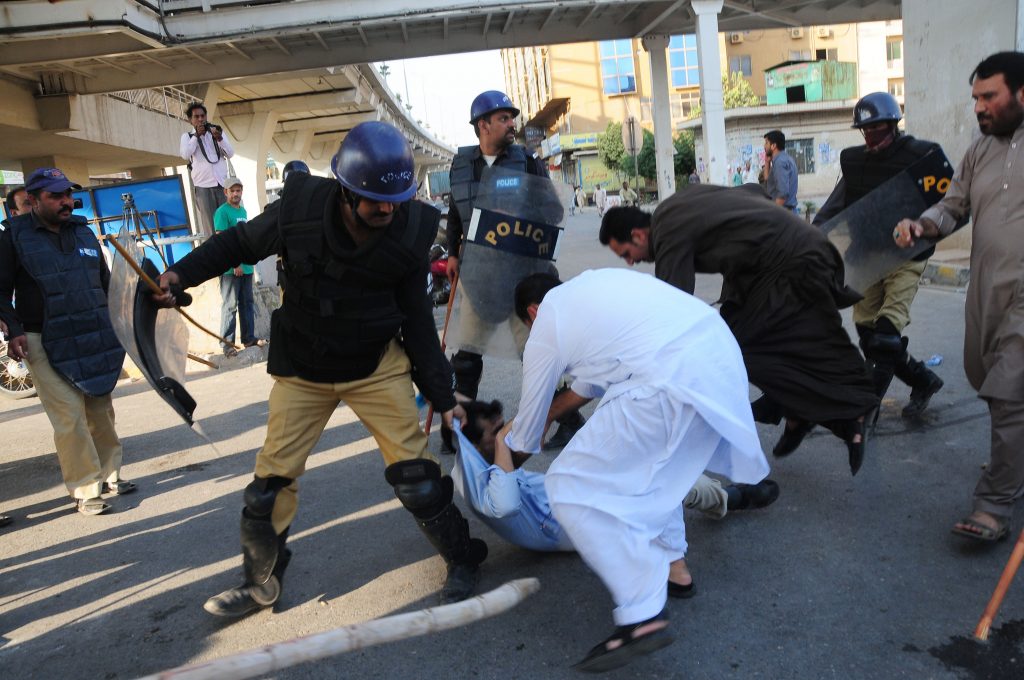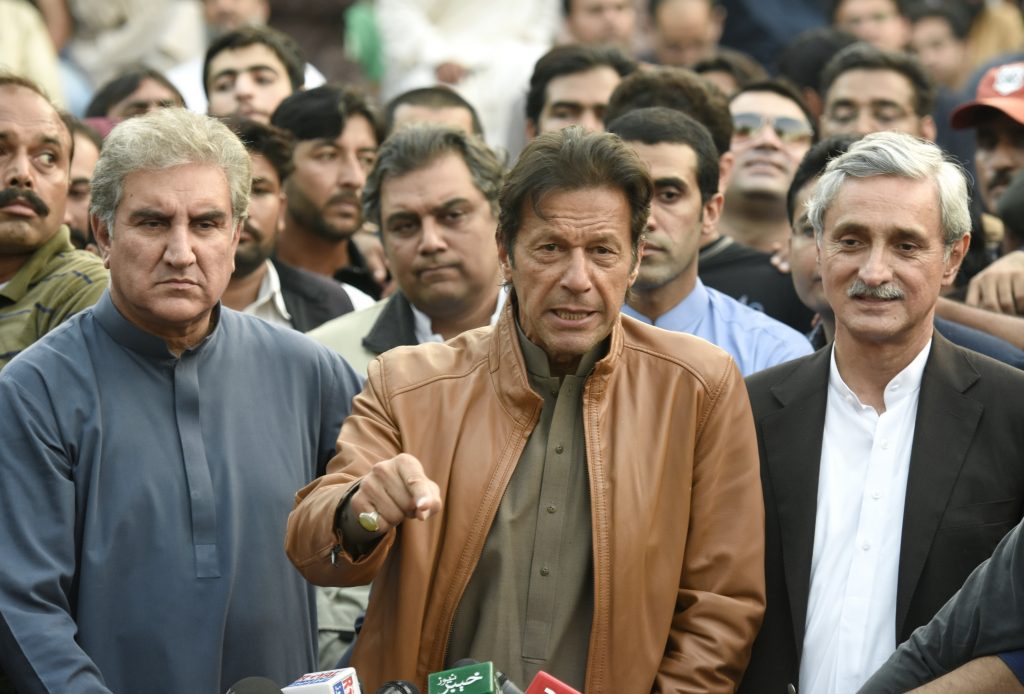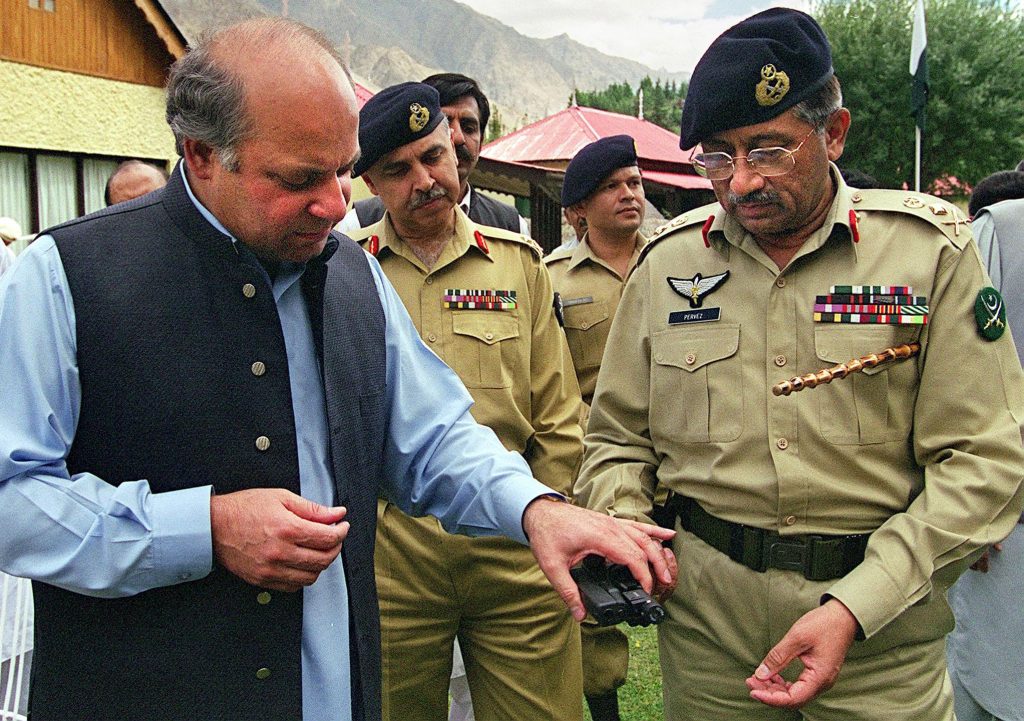Cover Story: Not on the Same page
By Syed Talat Hussain | Cover Story | Newsbeat National | Published 8 years ago
A tense calm prevails in the corridors of the Prime Minister’s House. The brisk movement of ministers and VIP visitors, and the chatter and exchange of pleasantries give the distinct impression of a functional government working on deadlines.
Inside a normal-sized room, striking for its lack of ostentation, sits Prime Minister Nawaz Sharif casually flicking through files and giving his aides general guidelines on the talking points for scheduled meetings. For a man in the middle of a full-blown political crisis involving his family, who could possibly be probed for money laundering through offshore companies by the Supreme Court, he is remarkably composed. He is not particularly pushed about the challenges facing him, says a close associate, except for one — that of appointing the next army chief. As General Raheel Sharif’s tenure nears its end, the Prime Minister is consumed by two considerations: who to appoint and, more importantly, when to appoint?
Seemingly this is a procedural matter: he needs to look at the list of the top five senior generals, select one to replace General Sharif, and a second to head the Joint Chiefs of Staff Committee. Yet this isn’t all that simple — not for him at least. He is heading a government in a country where anything to do with the army can become a matter of political survival.
Little wonder then that the Prime Minister’s consultations on the subject are exceedingly private. He has kept his cards so close to his chest that even his brother Shahbaz Sharif, Chief Minister of the Punjab, was brought into the debate about the next chief only recently. “No one knows what he is thinking. He does broach the subject with his close associates and others whose opinions he values, but it is very hard to read his mind,” says a close aide.
For someone who is third-time Prime Minister, and who may not be in the running for this office in the next term and, consequently, can afford to take bold decisions, he is being extremely cautious. And not without reason: Nawaz Sharif is holding in his hands a Pandora’s box of bedevilled civil-military ties that he fears may spring open if he were to make the wrong choice. Ironically, given the present scenario, there is no right choice as far as Nawaz Sharif is concerned. He finds himself knee-deep in trouble with the army, whose chief he chose three years ago. Now at the fag-end of his tenure, General Raheel Sharif, who was touted a true professional — a soldier’s soldier — at the time, is being seen by Prime Minister Sharif’s detractors, like the Pakistan Tehreek-e-Insaf’s Imran Khan, as a possible arbiter (or more to the point a quiet coup-maker) on the issue of whether Sharif should stay as Prime Minister or go.
The two Sharifs are poles apart on virtually every aspect of national life and a cold war rages between the two camps they command. Official accounts of everyone being on the same page are mere eyewash. Any keen observer of the civil-military scene can tell that there is a near collapse of mutual trust between Pindi (a general reference to General Headquarters) and Islamabad. On pro-army social media sites, Nawaz Sharif and his party are projected as being very pro-India — despite Narendra Modi’s toxic and hateful policies towards the country. Electronic media anchors, wired to the omnipresent Establishment, spend endless hours defining Nawaz Sharif as a security risk, with some even entreating General Raheel to overthrow the man and fulfil his duty to the nation. Chatrooms, where retired army officials speak their minds and hearts out, are filled with criticism against the Sharif government.
Increasingly, this refrain that Nawaz Sharif deserves to be jackbooted out, has become a prominent slogan in the attack launched by Imran Khan and his allies on the Sharifs. Not once but dozens of times a day, Khan calls Nawaz Sharif a threat to the national interest and suggests that the third umpire (generally understood to mean the army) will soon lift his finger and the incumbent Prime Minister will be rotting in jail. Recently, Khan tweeted an “interesting” article in The News that openly asked General Sharif to get rid of Nawaz Sharif as his parting favour to the nation.
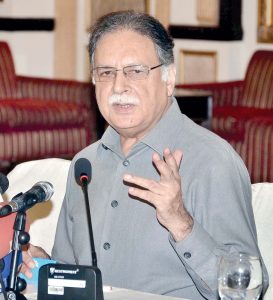 The army high command, of course, does not own or endorse in private nor in public, this flow of Trump-like tirade on the credentials of the Prime Minister. “We never tell anyone to do anything. We are not in this business,” says a recently retired Lt. General, who served under General Raheel Sharif. However, neither do they deny their association nor step in to stop the anti-Nawaz camp from repeatedly using the army’s name while blasting the Sharifs.
The army high command, of course, does not own or endorse in private nor in public, this flow of Trump-like tirade on the credentials of the Prime Minister. “We never tell anyone to do anything. We are not in this business,” says a recently retired Lt. General, who served under General Raheel Sharif. However, neither do they deny their association nor step in to stop the anti-Nawaz camp from repeatedly using the army’s name while blasting the Sharifs.
When a shadowy organisation, ‘Move On Pakistan,’ plastered the country’s main cities with General Raheel Sharif’s posters that at times asked him to continue for a few years more and, at other times, suggested that he should “intervene,” the hyperactive ISPR — the armed forces media arm — maintained a deliberate silence for a long time and only once made an attempt at publicly distancing itself from the organisation. It is still a mystery as to where this organisation got the funds from to run an expensive campaign like this one. When self-styled analysts attribute to defence sources outrageous claims of riot acts being read out to an elected Prime Minister by the army chief, the military spokesmen remain quiet. On the critical issue of implementation of the National Action Plan, the much talked about grand strategy to combat terrorism, the army’s official press releases carry the distinct flavour of self-praise — and disappointment with the civilian government’s efforts.
The other side, the Sharif camp, feels no less wronged. The saga of the Dawn story, which gave out details of the discussions in two high-level meetings on how to tackle extremist groups, typifies simmering grievances. The army’s stance is that the civilians have to reveal the names of those who leaked the contents of the story (which they say is patently false). The government, on the other hand, insists that none of its members leaked the details but at the end of the day, it had no option but to accept the charge and ask its Information Minister, Pervaiz Rashid, to step down — for “failing to stop the baseless story,” said Interior Minister Chaudhry Nisar Ali. More heads may roll once the expected enquiry commission on the Almeida Leaks, comprising senior government and intelligence officials (reportedly from the ISI, MI and IB), complete their investigations.
Pakistan is facing trying times. The terror-stricken nation has already heard the arrival shots of the dreaded Islamic State (IS) attacks, twice in Quetta, where dozens of lawyers and policemen were killed in two strikes barely two months apart. Our borders with India and Afghanistan are hot and bloody and a warlike situation prevails on both sides. Karachi, the country’s financial hub, is in the grip of intense politics and its potential for descending into chaos remains. Military operations in FATA, once the hub of Taliban activities, are yet to deliver total stability. Punjab, the largest of the country’s four provinces, is spilling over with organised militant groups that continue to make their presence felt through their proxies.
Why must a sitting government and the army be locked in a mutually tiring war of nerves?
The answer is to be found partly in history and partly in the present. In Pakistan’s 70 years of independence, the country’s 27 prime ministers (technically each with five-year terms, except for interim set-ups that supervised the elections) saw 10 army chiefs (technically with three-year tenures) come and go. Only two Prime Ministers, Zulfikar Ali Bhutto and Nawaz Sharif, could appoint five chiefs between them, even though in each case at least one of those they appointed overturned their governments. Bhutto was hanged by General Zia-ul-Haq. Sharif was sent into exile for almost a decade by General Pervez Musharraf. The key principle of Pakistan’s political system, it appears, is that the generals serve their full terms or more than their terms — while the Prime Ministers can be sent home. This turns the idea of civilian supremacy on its head. Elected governments are supposed to bring in heads of the army and not the other way around.
In the present context of civil-military ties, this is an important historical fact. If Nawaz Sharif is able to appoint the next army chief and then in the next term (which even his biggest critics believe he will win) also gets to nominate two more army heads, this could settle the decades-old question of who really calls the shots in the country.
The Sharif camp sees much of the past years’ attempts by its opponents at dislodging them from power in the light of this desire by the army as an institution to keep the civilians in check.
During Imran Khan’s last attempt to besiege the government in 2014 to force the Prime Minister’s resignation, Prime Minister Sharif accused the head of the ISI, General Zaheerul Islam, of orchestrating the entire episode.
“He told us that General Zaheer actually asked him to step aside for a month or so and let accusations of election-rigging against him be probed,” says the head of a political party, who wishes to remain anonymous. Months later, when Nawaz Sharif was asked this question in the presence of journalists, he did not deny the episode.
These events define the current situation that Prime Minister Sharif finds himself in. Just as the rigging charges became the basis of a protest against him, the Panama leaks too are perceived as a mere guise for another venture to cut short his tenure and create a national government.
“We don’t see a script as was there previously. We do see an outline, however, in which various possibilities exist: from sidelining the Sharif family to creating an environment for a military takeover. We don’t see anyone behind it, but the way Imran Khan has re-launched himself raises many questions that shall be answered by future historians,” says a business source closely aligned with the Sharif family.
The opposition insists that the Sharifs are corrupt and are using democracy as a mere shield for their crimes. However, questions were being asked as to why, after having moved the Supreme Court (SC) on the matter of the Sharifs’ corruption, Imran Khan and his party were still hell-bent on filling the streets of the capital. Incidentally , the dharna has been called off after the SC’s ruling on November 1. However, when the conflict spread and divisions deepened among the stakeholders of the democratic order, the army’s position as an arbiter was being openly discussed everywhere.
The constraint on General Sharif is that intervention by the army in a complex political situation would place the entire institution on the same slippery slope that it has been on for several decades, and could inevitably lead to a takeover. Life after an interjection is never the same: not for the individual who is at the forefront, nor indeed for the country. Three weeks away from retirement, General Raheel Sharif faces two choices: Either he does the right thing and lets the new man come in to replace him or he takes the adventurous path and plays saviour. The Sharif camp is convinced that there is no
justification for an army takeover. Prime Minister Sharif has told any number of significant visitors that the only way he is vacating this office is through the voters’ verdict. “It is 2016 and not the 1970s,” he is reported to have said to a visitor.
True that, but in the ’70s Bhutto had said something similar to a news scribe.
The writer is former executive editor of The News and a senior journalist with Geo TV hosting a prime time current affairs program.



